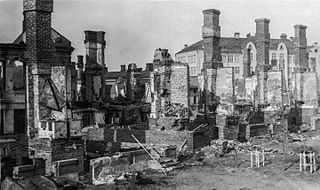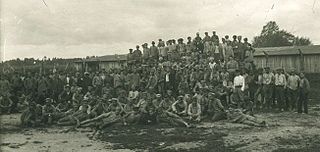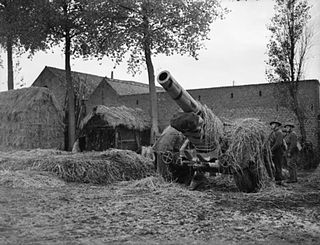 W
WThe Abushiri revolt was an insurrection in 1888–1889 by the Arab and Swahili population of the areas of the coast of East Africa that were granted, under protest, to Germany by the Sultan of Zanzibar in 1888. It was eventually surpressed by a German expedition corps which conquered the coastal area.
 W
WThe War in Afghanistan stems from the United States invasion of Afghanistan on 7 October 2001, when the United States of America and its allies successfully drove the Taliban from power in order to deny Al-Qaeda a safe base of operations in Afghanistan. Since the initial objectives were completed, a coalition of over 40 countries formed a security mission in the country called International Security Assistance Force, of which certain members were involved in military combat allied with Afghanistan's government. The war has afterwards mostly consisted of Taliban insurgents fighting against the Afghan Armed Forces and allied forces; the majority of ISAF/RS soldiers and personnel are American. The war is code named by the US as Operation Enduring Freedom (2001–14) and Operation Freedom's Sentinel (2015–present); it is the longest war in US history.
 W
WThe Boxer Rebellion (拳亂), Boxer Uprising, or Yihetuan Movement (義和團運動) was an anti-imperialist, anti-foreign, and anti-Christian uprising in China between 1899 and 1901, towards the end of the Qing dynasty.
 W
WThe Finnish Civil War was a civil war in Finland in 1918 fought for the leadership and control of Finland between White Finland and Finnish Socialist Workers' Republic during the country's transition from a Grand Duchy of the Russian Empire to an independent state. The clashes took place in the context of the national, political, and social turmoil caused by World War I in Europe. The war was fought between the Reds, led by a section of the Social Democratic Party, and the Whites, conducted by the conservative-based Senate and the German Imperial Army. The paramilitary Red Guards, composed of industrial and agrarian workers, controlled the cities and industrial centres of southern Finland. The paramilitary White Guards, composed of farmers, along with middle-class and upper-class social strata, controlled rural central and northern Finland led by General C. G. E. Mannerheim.
 W
WThe Franco-Prussian War or Franco-German War, often referred to in France as the War of 1870, was a conflict between the Second French Empire and the German states of the North German Confederation led by the Kingdom of Prussia. Lasting from 19 July 1870 to 28 January 1871, the conflict was caused primarily by France's determination to restore its dominant position in continental Europe, which it had lost following Prussia's crushing victory over Austria in 1866. According to some historians, Prussian chancellor Otto von Bismarck deliberately provoked the French into declaring war on Prussia in order to draw four independent southern German states—Baden, Württemberg, Bavaria and Hesse-Darmstadt—into an alliance with the North German Confederation dominated by Prussia. Some historians contend that Bismarck exploited the circumstances as they unfolded. None, however, dispute the fact that Bismarck must have recognized the potential for new German alliances, given the situation as a whole.
 W
WSudetendeutsches Freikorps was a paramilitary Nazi organization founded on 17 September 1938 in Germany on direct order of Adolf Hitler. The organization was composed mainly of ethnic German citizens of Czechoslovakia with pro-Nazi sympathies who were sheltered, trained and equipped by the German army and who were conducting cross border terrorist operations into Czechoslovak territory from 1938 to 1939. They played an important role in Hitler's successful effort to occupy Czechoslovakia and annex the region known as Sudetenland into the Third Reich under Nazi Germany.
 W
WThe Herero and Nama genocide was the first genocide of the 20th century, waged by the German Empire against the Ovaherero, the Nama, and the San in German South West Africa. It occurred between 1904 and 1908.
 W
WThe Anglo–Iraqi War was a British-led Allied military campaign against Iraq under Rashid Ali, who had seized power during the Second World War with assistance from Germany and Italy. The campaign resulted in the downfall of Ali's government, the re-occupation of Iraq by Great Britain, and the return to power of the Regent of Iraq, Prince 'Abd al-Ilah, a British ally.
 W
WDuring World War II, the Lapland War saw fighting between Finland and Nazi Germany - effectively from September to November 1944 - in Finland's northernmost region, Lapland. Although Finns and Germans had been fighting against the Soviet Union since 1941 during the Continuation War (1941-1944), the Soviet Vyborg–Petrozavodsk Offensive in the summer of 1944 forced the Finnish leadership to negotiate a separate peace agreement. The Moscow Armistice, signed on 19 September 1944, demanded for Finland to break diplomatic ties with Germany and to expel or disarm any German soldiers remaining in Finland after 15 September 1944.
 W
WThe Latvian War of Independence, sometimes called the Latvia's freedom fights or the Latvian War of Liberation, was a series of military conflicts in Latvia between 5 December 1918, after the newly proclaimed Republic of Latvia was invaded by Soviet Russia, and the signing of the Latvian-Soviet Riga Peace Treaty on 11 August 1920.
 W
WThe Lithuanian–Soviet War or Lithuanian–Bolshevik War was fought between newly independent Lithuania and the Russian Soviet Federated Socialist Republic in the aftermath of World War I. It was part of the larger Soviet westward offensive of 1918–1919. The offensive followed retreating German troops with intentions to establish Soviet republics in Ukraine, Belarus, Lithuania, Latvia, Estonia, Poland and link up with the German Revolution. By the end of December 1918 Soviet forces reached Lithuanian borders. Largely unopposed, they took one town after another and by the end of January 1919 controlled about 2⁄3 of the Lithuanian territory. In February, the Soviet advance was stopped by Lithuanian and German volunteers, who prevented the Soviets from capturing Kaunas, the temporary capital of Lithuania. From April 1919, the Lithuanian war went parallel with the Polish–Soviet War. Poland had territorial claims over Lithuania, especially the Vilnius Region, and these tensions spilled over into the Polish–Lithuanian War. Historian Norman Davies summarized the situation: "the German army was supporting the Lithuanian nationalists, the Soviets were supporting the Lithuanian communists and the Polish Army was fighting them all." In mid-May, the Lithuanian army, now commanded by General Silvestras Žukauskas, began an offensive against the Soviets in northeastern Lithuania. By mid-June, the Lithuanians reached the Latvian border and cornered the Soviets among lakes and hills near Zarasai, where the Soviets held out until the end of August 1919. The Soviets and Lithuanians, separated by the Daugava River, maintained their fronts until the Battle of Daugavpils in January 1920. As early as September 1919, the Soviets offered to negotiate a peace treaty, but talks began only in May 1920. The Soviet–Lithuanian Peace Treaty was signed on July 12, 1920. Soviet Russia fully recognized independent Lithuania.
 W
WThe Mali War is an ongoing armed conflict that started in January 2012 between the northern and southern parts of Mali in Africa. On 16 January 2012, several insurgent groups began fighting a campaign against the Malian government for independence or greater autonomy for northern Mali, which they called Azawad. The National Movement for the Liberation of Azawad (MNLA), an organization fighting to make this area of Mali an independent homeland for the Tuareg people, had taken control of the region by April 2012.
 W
WThe Phoney War was an eight-month period at the start of World War II, during which there was only one limited military land operation on the Western Front, when French troops invaded Germany's Saar district. The Phoney period began with the declaration of war by the United Kingdom and France against Nazi Germany on 3 September 1939, and ended with the German invasion of France and the Low Countries on 10 May 1940. Although there was no large-scale military action by Britain and France, they did begin some economic warfare, especially with the naval blockade, and shut down German surface raiders. They created elaborate plans for numerous large-scale operations designed to cripple the German war effort. These included opening an Anglo-French front in the Balkans, invading Norway to seize control of Germany's main source of iron ore and a strike against the Soviet Union, to cut off its supply of oil to Germany. Only the Norway plan came to fruition, and it was too little too late in April 1940.
 W
WThe German revolutions of 1848–49, the opening phase of which was also called the March Revolution, were initially part of the Revolutions of 1848 that broke out in many European countries. They were a series of loosely coordinated protests and rebellions in the states of the German Confederation, including the Austrian Empire. The revolutions, which stressed pan-Germanism, demonstrated popular discontent with the traditional, largely autocratic political structure of the thirty-nine independent states of the Confederation that inherited the German territory of the former Holy Roman Empire. This process began in the mid 1840s.
 W
WThe Second Samoan Civil War was a conflict that reached a head in 1898 when Germany, the United Kingdom, and the United States were locked in dispute over who should have control over the Samoan island chain, located in the South Pacific Ocean.
 W
WSokehs rebellion was an uprising of the Sokehs tribe against local German rule that started on Sokehs Island off the main island of Pohnpei in the Eastern Caroline Islands in 1910/1911. The German district commissioner, Gustav Boeder, three other German officials and five islanders were killed by the rebels before German naval units arrived and restored order.
 W
WThe Teltow and Magdeburg Wars were fought between 1239 and 1245 over possession of Barnim and Teltow in the present-day federal German state of Brandenburg. They took place in the 13th century during the course of the Eastern German Expansion. The opposing sides during the armed conflict, which took place on two fronts simultaneously, were:The Margraviate of Brandenburg, led by the Ascanian rulers John I, Margrave of Brandenburg and Otto III, Margrave of Brandenburg. The Margravate of Meissen, led by Henry III, Margrave of Meissen of the House of Wettin, and Wilbrand von Käfernburg, the then-Archbishop of Magdeburg.
 W
WThe War on terror, also known as the Global War on Terrorism and U.S. War on Terror, is an international military campaign launched by the United States government after the September 11 attacks. The targets of the campaign are primarily Sunni Islamic fundamentalist armed groups located throughout the Muslim world, with the most prominent groups being Al-Qaeda, the Islamic State, the Taliban, Tehrik-i-Taliban Pakistan, and the various franchise groups of the former two organizations. The naming of the campaign uses a metaphor of war to refer to a variety of actions that do not constitute a specific war as traditionally defined. U.S. president George W. Bush first used the term "war on terrorism" on 16 September 2001, and then "war on terror" a few days later in a formal speech to Congress. In the latter speech, George Bush stated, "Our enemy is a radical network of terrorists and every government that supports them." The term was originally used with a particular focus on countries associated with al-Qaeda. The term was immediately criticised by such people as Richard B. Myers, chairman of the Joint Chiefs of Staff, and more nuanced terms subsequently came to be used by the Bush administration to publicly define the international campaign led by the U.S. While it was never used as a formal designation of U.S. operations in internal government documentation, a Global War on Terrorism Service Medal was issued.
 W
WThe Thirty Years' War was primarily fought in Central Europe between 1618 and 1648. Estimates of the total number of military and civilian deaths which resulted range from 4.5 to 8 million, the vast majority from disease or starvation. In some areas of Germany, it has been suggested up to 60% of the population died.
 W
WThe Ukrainian War of Independence, a period of sustained warlike conflict, lasted from 1917 to 1921 and resulted in the establishment and development of a Ukrainian republic, most of which was later absorbed into the Soviet Union as the Ukrainian Soviet Socialist Republic of 1922–1991.
 W
WWorld War I was a global war originating in Europe that lasted from 28 July 1914 to 11 November 1918. Contemporaneously known as the Great War or "the war to end all wars", it led to the mobilisation of more than 70 million military personnel, including 60 million Europeans, making it one of the largest wars in history. It is also one of the deadliest conflicts in history, with an estimated nine million combatant deaths and 13 million civilian deaths as a direct result of the war, while resulting genocides and the related 1918 Spanish flu pandemic caused another 17–100 million deaths worldwide, including an estimated 2.64 million Spanish flu deaths in Europe and as many as 675,000 Spanish flu deaths in the United States.
 W
WWorld War II, also known as the Second World War, was a global war that lasted from 1939 to 1945. It involved the vast majority of the world's countries—including all the great powers—forming two opposing military alliances: the Allies and the Axis. In a state of total war, directly involving more than 100 million people from more than 30 countries, the major participants threw their entire economic, industrial, and scientific capabilities behind the war effort, blurring the distinction between civilian and military resources. World War II was the deadliest conflict in human history, marked by 70 to 85 million fatalities. Tens of millions of people died due to genocides, premeditated death from starvation, massacres, and disease. Aircraft played a major role in the conflict, including in the use of strategic bombing of population centres, and the only uses of nuclear weapons in war.